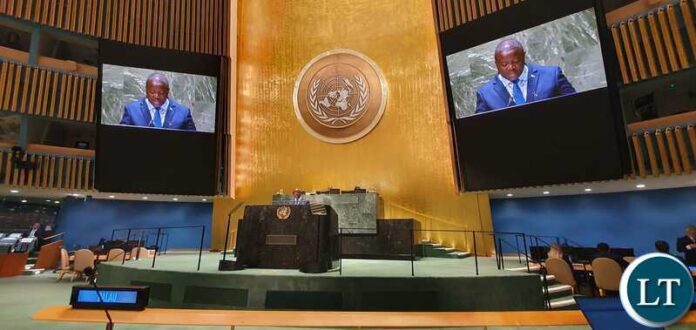
By Kapya Kaoma
Once a darling of the West, President Hakainde Hichilema’s decision not to attend the United Nations General Assembly—likely the last of his presidency—speaks volumes.
For a man often accused of narcissism, his absence from such a global stage is surprising. Or is it? On September 26, 2021, I warned in the Lusaka Times after U.S. President Joe Biden hailed Hichilema as Africa’s new anti-corruption champion at the UN. Biden went so far as to compare Zambia disfavorably in terms of corruption to Congo, Somalia, and Sudan. Instead of defending Zambia’s dignity, Hichilema smiled and basked in the applause. His supporters—“Bally worshippers”—cheered, convinced their leader had placed Zambia firmly on the world map.
Four years later, that same “anti-corruption crusader” presides over a government now cited for graft and human rights abuses. Zambia has been blacklisted by the United States–for corruption and human rights abuses. The very allies who once embraced Hichilema now look on his government with suspicion. Thus, rather than face the scrutiny of the UN, he is hiding away. But what has changed? Nothing—except that the mask has slipped. He cannot lie forever.
The truth is what I cautioned years ago. Hichilema is a master of deception. He promised transparency yet never declared his wealth or allowed real investigations into his officials. He vowed to uphold human rights, yet political violence and police brutality have worsened. Today, speaking out is treated as a capital offense. Even within his party, whispers abound about UPND cadres terrorizing citizens. The abuses Zambians thought they had buried with the Patriotic Front have returned—sometimes worse.
Chibokolo, infamous for insulting the late President Lungu and a die-hard Hichilema supporter, is an example. He was recently attacked by UPND cadres. Worse, cadres continue to openly terrorize people while the president looks on.
Hichilema governs less like a democrat and more like a petty autocrat. The man is so insecure that he can be threatened by a “mosquito,” he orders arrests of opponents no matter how small or insignificant, clamps down on protests, and tolerates violence in his name. Social media is closely monitored—at what cost to our freedoms? His stature as head of state has withered, reduced to little more than the title “President of Zambia.” Many citizens now say they would sooner vote for a frog than for Hichilema in 2026. Go to the markets—this is their truth.
With elections just eleven months away, what can he claim as achievements? Commissioning unplastered toilets? A trail of poorly executed CDF projects or cheap trucks? Demolished homes? Silencing dissent? Arresting rivals? This is hardly the record of a reformer.
Instead, his legacy is shaping up as one of broken promises, entrenched corruption, justice denied, democracy weakened by fear, and starvation. Even his own vice president has denied his campaign pledges in Parliament, as though we lived in the dark ages. But the nation remembers—we all heard those promises repeated for years. For Hichilema, truth is elastic, bent for convenience. For the rest of us, that is simply lying.
Time is running out. Unless he flees into exile, the very prisons he now fills with opponents may one day house him. For his children, one can only hope they are spared the humiliation that has dogged the families of disgraced leaders before him. But Hichilema cannot outrun accountability. His fall from grace is not a question of if, but when. The only question is whether August 2026 will come too late.

